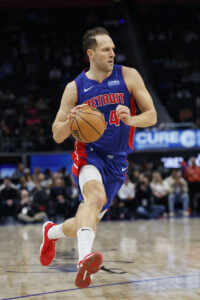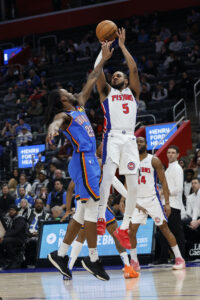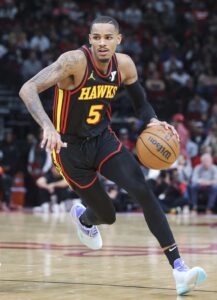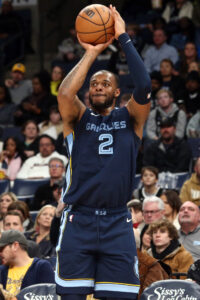Most of the marquee in-season trades that took place during the 2023/24 season happened well before the trade deadline, including James Harden to the Clippers in November, OG Anunoby to the Knicks in December, and Pascal Siakam to the Pacers in January.
Still, there was no shortage of trade activity during the 30 hours leading up to the deadline, with 22 teams getting together to complete 19 trades on Wednesday and Thursday. A total of 46 NBA players were on the move in those deals, along with four more draft-and-stash players and plenty of draft picks and cash.
Here’s a recap all of 2024’s deadline deals:
Trades made on deadline day
 The Knicks pick up a pair of solid rotation players (story)
The Knicks pick up a pair of solid rotation players (story)
- Knicks acquire Bojan Bogdanovic and Alec Burks.
- Pistons acquire Evan Fournier, Malachi Flynn, Quentin Grimes, Ryan Arcidiacono, the Knicks’ 2028 second-round pick, and the Knicks’ 2029 second-round pick.
The Sixers trade for one of the NBA’s best three-point shooters (story)
- Sixers acquire Buddy Hield.
- Pacers acquire Doug McDermott, Furkan Korkmaz, the Raptors’ 2024 second-round pick, the Trail Blazers’ 2029 second-round pick, and cash (from Sixers).
- Spurs acquire Marcus Morris, the Clippers’ 2029 second-round pick, and cash (from Sixers).
- Note: The 2024 second-rounder technically has “most favorable” language, but there’s essentially no chance it won’t be Toronto’s pick.
Danny Ainge continues to stockpile draft assets (story)
- Raptors acquire Kelly Olynyk and Ochai Agbaji.
- Jazz acquire Otto Porter, Kira Lewis, and either the Thunder’s, Clippers’, Rockets’ (top-four protected), or Jazz’s (top-10 protected) 2024 first-round pick (whichever is least favorable).
The Mavericks undo an offseason acquisition and swap power forwards (story)
- Mavericks acquire P.J. Washington, the Celtics’ 2024 second-round pick, and a 2028 second-round pick.
- Hornets acquire Grant Williams, Seth Curry, and the Mavericks’ 2027 first-round pick (top-two protected).
The Mavericks line up a draft asset to use in a separate deal… (story)
- Mavericks acquire either the Thunder’s, Clippers’, Rockets’ (top-four protected), or Jazz’s (top-10 protected) 2024 first-round pick (whichever is second-least favorable).
- Thunder acquire the right to swap first-round picks with the Mavericks in 2028.
… The Mavs make use of that draft asset to upgrade at center (story)
- Mavericks acquire Daniel Gafford.
- Wizards acquire Richaun Holmes and either the Thunder’s, Clippers’, Rockets’ (top-four protected), or Jazz’s (top-10 protected) 2024 first-round pick (whichever is second-least favorable).
The upstart Thunder add a veteran for their playoff run (story)
- Thunder acquire Gordon Hayward.
- Hornets acquire Davis Bertans, Vasilije Micic, Tre Mann, the Rockets’ 2024 second-round pick, the Sixers’ 2025 second-round pick, and cash.
The Suns acquire some extra help on the wing (story)
- Suns acquire Royce O’Neale and David Roddy.
- Nets acquire Keita Bates-Diop, Jordan Goodwin, either the Pistons’, Bucks,’ or Magic’s 2026 second-round pick (whichever is least favorable; from Suns), the Grizzlies’ 2028 second-round pick (from Suns), the Grizzlies’ 2029 second-round pick (from Suns), and the draft rights to Vanja Marinkovic (from Grizzlies).
- Grizzlies acquire Yuta Watanabe, Chimezie Metu, and the right to swap their own 2026 first-round pick for either the Suns’, Magic’s, or Wizards’ 2026 first-round pick (whichever is least favorable).
The Timberwolves aim to solidify their backup point guard spot (story)
- Timberwolves acquire Monte Morris.
- Pistons acquire Shake Milton, Troy Brown, and the Timberwolves’ 2030 second-round pick.
The Nets swap point guards, while the Raptors clear more 2024 cap room (story)
- Raptors acquire Spencer Dinwiddie.
- Nets acquire Dennis Schröder and Thaddeus Young.
The Bucks look to improve their perimeter defense with the help of a conference rival (story)
- Bucks acquire Patrick Beverley.
- Sixers acquire Cameron Payne and the Bucks’ 2027 second-round pick.
The Celtics add some frontcourt depth (story)
- Celtics acquire Xavier Tillman.
- Grizzlies acquire Lamar Stevens, the Hawks’ 2027 second-round pick, and the Mavericks’ 2030 second-round pick.
The Celtics add some backcourt depth (story)
- Celtics acquire Jaden Springer.
- Sixers acquire either the Bulls’ or the Knicks’ 2024 second-round pick (whichever is most favorable).
The Pistons land an RFA-to-be wing who’s in their future plans (story)
- Pistons acquire Simone Fontecchio.
- Jazz acquire Kevin Knox, either the Wizards’ or the Grizzlies’ 2024 second-round pick (whichever is most favorable), and the draft rights to Gabriele Procida.
The Sixers dip below the luxury tax line (story)
- Pistons acquire Danuel House, the Knicks’ 2024 second-round pick, and cash.
- Sixers acquire the Pistons’ 2028 second-round pick (top-55 protected).
The Warriors and Pacers make a deal that financially benefits both sides (story)
- Pacers acquire Cory Joseph, the Hornets’ 2025 second-round pick (top-55 protected) and cash ($5.8MM)
- Warriors acquire the least favorable of the Pacers’ 2024 second-round picks.
- Note: In all likelihood, the 2024 pick will be the least favorable of the Bucks’ and Cavaliers’ second-rounders.
The Bucks dump some salary (story)
- Kings acquire Robin Lopez and cash.
- Bucks acquire the draft rights to Dimitrios Agravanis.
The Celtics reduce their tax bill (story)
- Trail Blazers acquire Dalano Banton and cash.
- Celtics acquire either the Trail Blazers’ or Pelicans’ 2027 second-round pick (whichever is least favorable; top-55 protected).
The Clippers take advantage of their last opportunity to trade cash for a while (story)
- Clippers acquire the draft rights to Ismael Kamagate.
- Nuggets acquire cash ($2.68MM).
Notable trade candidates who stayed put
 Dejounte Murray, Hawks (story)
Dejounte Murray, Hawks (story)- Kyle Kuzma, Wizards (story)
- Miles Bridges, Hornets (story)
- DeMar DeRozan, Alex Caruso, and Andre Drummond, Bulls
- Andrew Wiggins and Chris Paul, Warriors
- Bruce Brown and Gary Trent Jr., Raptors
- D’Angelo Russell, Lakers
- Malcolm Brogdon, Trail Blazers
- Dorian Finney-Smith, Nets
- Tyus Jones and Delon Wright, Wizards
- Harrison Barnes, Kevin Huerter, and Davion Mitchell, Kings
Players waived on deadline day
Officially released:
- James Bouknight, Hornets (story)
- Spencer Dinwiddie, Raptors (story)
- Danilo Gallinari, Pistons (story)
- Harry Giles, Nets (story)
- Joe Harris, Pistons (story)
- Killian Hayes, Pistons (story)
- Danuel House, Pistons (story)
- Cory Joseph, Pacers (story)
- Robin Lopez, Kings (story)
- Frank Ntilikina, Hornets (story)
- Victor Oladipo, Grizzlies (story)
- Ish Smith, Hornets (story)
- Thaddeus Young, Nets (story)
Expected to be bought out or waived:
- Ryan Arcidiacono, Pistons (story)
- Jordan Goodwin, Nets (story)
- Furkan Korkmaz, Pacers (story)
- Chimezie Metu, Grizzlies (story)
- Marcus Morris, Spurs (story)
 What does that mean in practical terms? Let’s use Grizzlies big man
What does that mean in practical terms? Let’s use Grizzlies big man